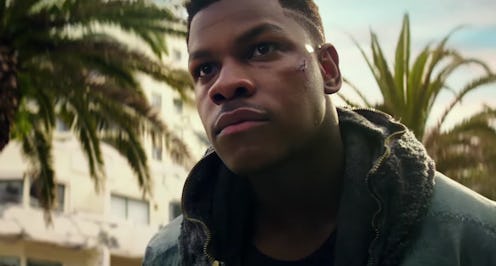Entertainment
How The Ending Of 'Pacific Rim Uprising' Totally Changes The Game For The Monster Series

Fans of Pacific Rim might think that the war between the Kaiju and the humans of Earth was won when Stacker Pentecost (Idris Elba) "cancelled the apocalypse" and sacrificed himself to close the breach between the Kaiju alien world and Earth, but those fans would be wrong. In Pacific Rim Uprising there is a new Kaiju apocalypse threat that must be cancelled, this time by Pentecost's son Jake (John Boyega). Spoiler alert: he succeeds, but the Pacific Rim Uprising post-credits scene suggests that the apocalypse has not been cancelled, merely delayed.
The Pacific Rim Uprising post-credits scene leaves the door wide open for a third film, and fans dying for another sequel won't have to sit through the entire end credits to get a look at what's to come. The post-credits scene is comes right after the title card at the end of the movie, making it feel more like a second ending or added footnote than a bonus scene. But before we get into what the scene is and what it means, a little Pacific Rim Uprising explanation is needed.
Major spoilers ahead! The movie picks up 10 years after the events of Pacific Rim. The Kaiju are long gone, cities have been rebuilt, and society has, for the most part, recovered. All of that changes, however, when Shao, a new Chinese tech company, is hoping to replace the traditional Jaeger program with drone robots that can be operated remotely by just one pilot instead of two pilots in the robots themselves. The launch of these new drones, however, reveals a traitor. Someone at Shao Industries has infused the drones with genetically cloned Kaiju biology, and as soon as they are deployed they turn against their human operators and begin opening a series of breaches to allow real Kaiju to invade Earth once again. Apocalypse warning: extremely high.
It's later revealed that the traitor is actually Newt (or Dr. Newton Geiszler), the lovable genius who drifted with the Kaiju in Pacific Rim in an effort to discover how to defeat the alien invasion. When he drifted with the alien (aka shared a neural link with it), the Precursor aliens who invented the Kaiju infected him. Something about their bond let the Precursors gain control of his brain. His secret alien brain, Alice, that he drifted with every night probably didn't help either. Taken over by the Precursors, Newt is completely brainwashed, branded a traitor. And, while many would like to see him dead, Herman Gottlieb insists that he not be hurt. Science bros stick together, and Herman is convinced that there's still a bit of Newt left in there. At the very end of the film Newt is knocked out and taken prisoner, and this is where the post-credits scene comes in.
The short post-credits scene features Jake paying Newt a visit in his new prison quarters. Still infected by the Precursors, Newt is threatening another invasion, yelling, "We're gonna keep coming! We're never gonna stop!" Jake, however, is unbothered. He's cool and calm when he informs Newt that the Precursors will not win. In fact, they won't even get a chance to attack Earth again, because that's not where this war is going. "We're gonna come for them," he promises. Boom, drop the mic.
What does the Pacific Rim Uprising mean for future Pacific Rim movies? Well, it definitely means that filmmakers hope for another round of Kaiju vs. Jaeger fights. More importantly, the ending suggests that fans might finally get to see the Precursors in all of their alien glory. If Jake means what he says, that the humans will be coming for the Precursors instead of the other way around, then it's possible a third Pacific Rim movie could take place in the Antiverse, where the Precursors are from. It would be a Pacific Rim unlike any we have seen before.